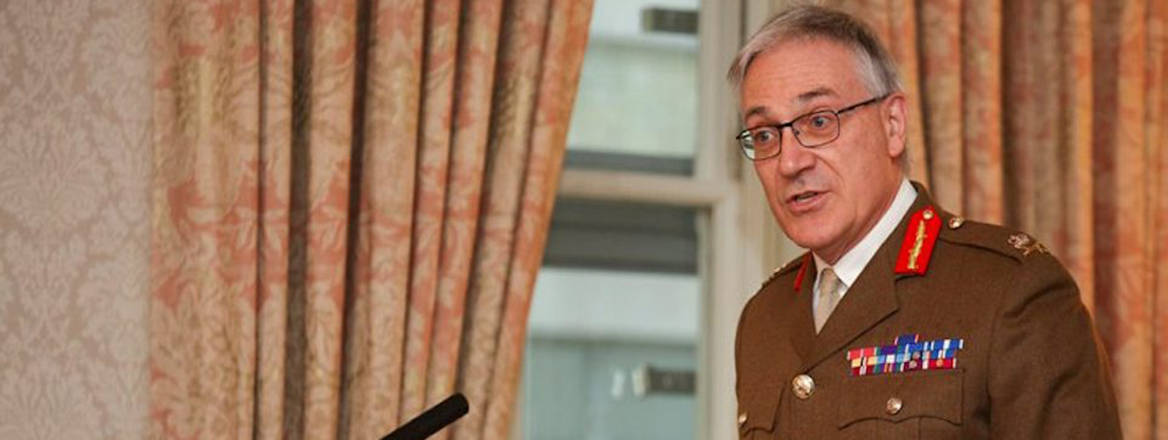The Defence Committee’s Climate Change Inquiry
The UK Ministry of Defence has made significant progress on its climate change strategy, but it is still early days, and the government must recognise the barriers to transformation in terms of finance and communication.
The House of Commons Defence Committee is conducting an inquiry into ‘Defence and Climate Change’. It is investigating the Integrated Review (IR) of Security, Defence, Development and Foreign Policy’s number one priority of meeting climate change commitments over the next decade. It is also interested in the impacts of climate change on future conflicts, how the UK’s Armed Forces are adapting to these changes, and the Ministry of Defence’s (MoD) contribution to the UK’s net zero targets. Finally, its remit includes the likely increased demand to respond to Military Aid to the Civilian Authorities tasks due to extreme weather.
The session on 22 November 2022 saw Lieutenant General (Retired) Richard Nugee give evidence to the panel. In March 2021 he was appointed as the MoD’s Non-Executive Director for Climate Change and Sustainability. This role came after the introduction of the MoD’s Climate Change and Sustainability Strategic Approach (CC&SSA). He attends the Defence Safety and Environment Committee, which provides top-level oversight for environmental policy.
Key Themes
Climate change is directly and indirectly influencing defence outputs. Mass migration, fuelling and resupply, infrastructure, equipment and training were all discussed. General Nugee reiterated the MoD’s principal sustainability ambitions, namely the adaptation of bases and vehicles, contributing to the government’s net zero target, and being a leader on the security implications of climate change. Managing climate-induced migration featured heavily, although the discussion ventured outside the MoD’s remit into wider government business, which was perhaps a wasted opportunity.
Emissions from fuel were a key discussion point as the focus of current efforts. General Nugee reported that 59% of the Navy’s and 77% of the Air Force’s emissions are produced from fuel. (The MoD has subsequently clarified that the actual figure for the Navy is 63%.) It was stressed that a solution could not come from the UK by itself, let alone defence. The Voyager flight was completed using sustainable fuel, setting a promising precedent for the future, though partner countries’ programmes are important as platforms must refuel around the world. Basing and infrastructure are concerns, including the impact of sea level rises on naval bases and Gibraltar’s runway. Overseas basing was mentioned, with power generation to the Falkland Islands and Cyprus raised as areas of concern.
The potential of small modular reactors (SMRs) was debated. An SMR in a shipping container can produce 5 megawatts for five years without refuelling. There is significant potential to power deployed bases. Delivering fuel to bases has been costly to military forces, both in lives and money. SMRs can reduce the need to move fuel around the battlefield in a contested environment. Treasury rules require products to have comparators through which to analyse their value. Rolls Royce’s SMR production is hindered because there are no products for the Treasury to compare against. Consequently, progress is stalled until a competitive product arrives. Though the Chair acknowledged the problem, the government does not recognise that UK defence is not a big enough customer to justify competitive markets for bespoke products. Such approaches are constraining.
The last two years have seen a remarkable shift in defence’s engagement with the topic. The MoD has reduced its emissions by 54% since 2010 by utilising existing technologies – a strong performance compared to other states’ defence ministries. The Army is in the process of setting up 80 solar farms under Project PROMETHEUS, some of which are operational. At RAF Marham, a biogas plant is producing 95% of the base’s energy requirements.
Though defence will always play a role in domestic national security and reducing the wider government’s carbon emissions, it cannot prioritise green ambitions over the ability to fight and win
In military planning, the US is leading the way by incorporating climate-related scenarios into its wargaming activities. Think tanks and NATO are engaging in a similar approach. The Hague Centre for Strategic Studies recently wargamed how to move towards net zero while also improving military capability. The UK is still looked to as a thought leader in this area.
Governance Paradox
Though the CC&SSA was cited, at times, questions indicated a lack of clarity on its epochs and the wider role of defence. The CC&SSA is split into three epochs of work, with workflows to be intentionally ‘disaggregated across Defence’s organisations’. Defence is one year into epoch one (2021–2025), which seeks to identify ways to reduce emissions within the supply chain, and to create skill- and datasets across the services to inform a plan for epochs two and three. James Clare has been tasked to develop a detailed climate change policy as Director of the Climate Change and Sustainability directorate, with work well underway. Defence is fully committed to achieving the 2032 public sector estate target of 50% emissions, and it still has the rest of epoch one to determine the appropriate priorities and pace for wider works, which must be measured against the broader needs of the services.
Defence’s climate commitments are limited by budget, which already constrains transformation, placing pressure on the ability to meet commitments made outside defence. Governments must recognise that defence cannot afford to create solutions to societal problems, such as alternative fuels. Instead, industry will lead the way. Defence should be celebrated for the work it has already done to reduce estate emissions, and be financially supported as it starts to tackle more expensive issues, such as adapting existing platforms and creating new ones to enhance capabilities, become more sustainable and reduce emissions.
The government must learn from Ajax – there is not always a skilled competitor because UK defence is not a big enough customer to justify competition in some areas. Insisting on competition ignores the realities of a niche industry. Government-set budgets limit the ability of defence to transform at the pace of relevance, and do not match the threats faced or the technological transformation required to fight contemporary and future wars. Neither budgets nor process serve defence well.
Budgets do not reflect the increasing demands on defence both domestically and internationally. Short-termism limits upfront expenditure, regardless of whole-life benefits, placing particular limitations on projects to retrofit housing, which are also responding to long-known welfare concerns. Defence cannot always prioritise future threats over existing ones. Current budgets leave no room to prioritise climate change over equipment, platforms and general welfare. While increased funding is always welcome, without ringfencing or stipulations for expenditure, defence must balance this tension.
Takeaways
The wide-ranging nature of the questioning reflects the breadth of defence-relevant topics which fall under the umbrella of climate change, but also a lack of understanding from the panel on the role of defence in national security and its relationship with the government. Though defence will always play a role in domestic national security and reducing the wider government’s carbon emissions, it cannot prioritise green ambitions over the ability to fight and win. The need to defend the realm is paramount.
The inquiry must result in a budget that reflects defence’s priorities, otherwise expectations and realities may diverge
There are three emerging themes which will likely frame the inquiry. Firstly, timescales and reporting. The timing of the government inquiry is not in keeping with the CC&SSA. It indicates that climate change is critical to the IR and wider society, yet also demonstrates a disconnect with the pace defence has set itself. The MoD follows the Greenhouse Gas Protocol for reporting emissions, but the single services find this difficult to navigate at times. Some climate scientists argue that current reporting is not sufficient, particularly within the single services.
Secondly, budgets and financial prioritisation. Defence budgets are plagued by deficits, short-termism and constraints. The government has not provided appropriate funding for wider technological transformation, nor for climate-related projects. The inquiry offers an opportunity for the government to accept that if it will not finance climate works specifically, then it must facilitate the embedding of climate change into day-to-day practice, much like health and safety. Such an approach should not come at the expense of funding in other areas.
Lastly, communications. Defence must improve communications with public audiences, sharing positive results. However, policymakers must also make space for defence to communicate the problem on its own terms, particularly when it comes to prioritisation. The UK’s armed forces are experts on protecting the country through lethal force, not climate science or civil security. Inquiry members must remain focused on defence’s needs and allow it to communicate its successes and concerns.
Conclusion
General Nugee’s session allowed inquiry members to familiarise themselves with how climate change is affecting defence, how defence affects the environment, and how it might respond. Despite attempts by the inquiry organisers to focus the themes of the sessions, and the many examples given by General Nugee to illustrate defence’s chosen pathways, it seems that the real challenge may be keeping inquiry members focused on the challenges facing defence, as opposed to the wider UK.
If inquiry members can truly engage with the CC&SSA and what it might mean for the IR, the inquiry offers a genuine opportunity to bring the defence conversation into the public eye and to think creatively about how government policy can enable defence to maintain its position as a thought leader while preserving its lethal advantage. The inquiry must result in a budget that reflects defence’s priorities, otherwise expectations and realities may diverge. Though the government has challenged defence to reduce its emissions, it must now respond to the challenge: how will you enable defence to prepare to protect the UK in a climate changed world?
The views expressed in this Commentary are the authors', and do not represent those of RUSI or any other institution.
Have an idea for a Commentary you’d like to write for us? Send a short pitch to commentaries@rusi.org and we’ll get back to you if it fits into our research interests. Full guidelines for contributors can be found here.
WRITTEN BY
Dr Sarah Ashbridge
Affiliate Expert, Military Sciences
Major Patrick Hinton
Former Chief of the General Staff’s Visiting Fellow
Military Sciences
- Jim McLeanMedia Relations Manager+44 (0)7917 373 069JimMc@rusi.org



